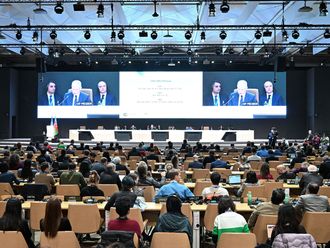London: The council at the centre of a row over an Italian woman who was given a forced caesarean section and then had her baby taken from her said the decision was taken over concerns about the “risks to mother and child”.
According to reports, the 35-year-old woman came to Britain in July 2012 when heavily pregnant for a training course at Stansted airport in Essex. She reportedly had a panic attack connected to a failure to take regular medication for an existing bipolar condition, and was restrained and sectioned under the Mental Health Act.
Essex social services won a high court order for the birth to be carried out by caesarean section and the baby girl, born in August, was taken into care. The mother returned from Italy in February to request custody of her daughter, telling a family court judge, Roderick Newton, that she had come to terms with her condition and was now sufficiently well. Newton expressed sympathy and said the mother was coherent and convincing, but ruled that social workers’ concerns that the woman might again neglect to take her medication meant the girl, now 15 months, should be placed for adoption.
In a statement yesterday, the council said: “The long-term safety and well-being of children is always Essex County Council’s priority. Adoption is never considered until we have exhausted all other options and is never pursued lightly.”
The health trust had been looking after the mother since 13 June 2012 under the mental health act. Because of its concerns, it contacted Essex social services. Five weeks later it was the trust’s clinical decision to apply to the high court for permission to deliver the unborn child by caesarean section “because of concerns about risk to mother and child”, the council said.
“Historically, the mother has two other children which she is unable to care for due to orders by the Italian authorities. In accordance with Essex County Council’s Social Services practice, social workers liaised extensively with the extended family before and after the birth of the baby, to establish if anyone could care for the child.”
An MP who has taken up the woman’s case is in discussions with the mother about what to do over the issue.
John Hemming, the Liberal Democrat MP for Birmingham Yardley, said in a statement that he was also in touch with Italian officials to find out if they could help. Hemming, who chairs the Justice for Families Campaign, has said he hopes to raise the matter in parliament.
“Unsurprisingly, there is a lot of media interest in this case,” he said. “We do, however, need to remember that at the centre of this case is a mother and a baby, and the wider family including two siblings of the baby.”
A spokesman for the judiciary said: “The proceedings are not yet concluded. The president [Sir James Munby] has ordered that the matter be transferred to the high court and any further applications in respect of the child are to be heard by him.”
Hemming said: “I welcome the transfer of the case from Chelmsford county court to the high court in front of the president of the family division. The appointment of the president of the family division was a very positive step and I am certain that any applications to him will be heard justly.
“I remain concerned that many decisions taken by the family courts are taken by the magistrates court (the family proceedings court) and are then appealed to the county court. This means that domestic proceedings can be exhausted without a case getting out of the area in which it is considered.
“This means that there is never any public judgement and the case in the UK has come to an end. All people can then do is to take their case to Strasbourg.”
He also criticised Essex council for failing “to follow proper proceedings”. He said: “The rules are straightforward when it comes to foreign nationals and care proceedings. The foreign country concerned should be contacted through their central authority [in Italy’s case part of the Justice Ministry]. This clearly did not happen and for this Essex County Council are clearly in the wrong. Essex have not managed to explain why no one in the wider extended family was competent to look after the baby when they were already looking after two of her siblings.
“Additionally, Essex have not explained why this baby was in their control to get adopted when the mother always intended to return to Italy.”
Other groups have expressed concern about the case of the Italian woman, including the charity Bipolar UK and the human rights organisation Liberty.












